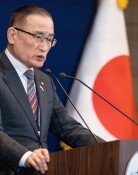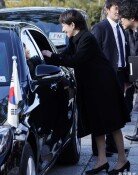No Peace at Resistance Leaders Grave
No Peace at Resistance Leaders Grave
Posted February. 22, 2006 04:32,
A small, temporary gravesite in Namseong-myeon, Cheongwon-gun, North Chungcheong Province is barely recognizable, and the sod above it is severely damaged. If it were not for the gravestone, people might think it was an abandoned grave.
Mourners visited the grave on Tuesday to pay their respects to Danjae Shin Chae-ho, (December 8, 1880 - February 21, 1936) a man with no nationality. Shin, a journalist and historian, was an independence activist who fought to establish the provisional government of the Republic of Korea during Japanese colonial rule and led the national bond compensation movement. Tuesday marked the 70th anniversary of his death.
Shin died in a prison in Lüshun, Manchuria in China. He was buried at this site in 1936, the place where he spent his youth.
Shins descendents tried to move the grave in 2004, but the Cheongwon-gun Office denied their request, saying that the gravesite is a cultural asset of North Chungcheong Province.
On September 22, 2004, Lee Deok-nam, the 62-year-old daughter-in-law of Shin, got into trouble with Cheongwon-gun authorities by attempting to move the grave with the help of an excavator.
By the time the attempt was discovered, the grave mound had already been dug up, and the remains of the body could be seen. The grave had lost its shape, and the gravestone was dug up. Cheongwon-gun officials made a temporary grave 10 meters away and re-interred the remains.
In a telephone interview, Lee, who currently lives in China, said that she tried to move the grave because the water table under the grave had repeatedly damaged the grave mound and the grave was poorly maintained.
She said that she has been looking for the landowner who owns the land where Shins remains were buried and that she has been fighting Cheongwon-gun, but that she sees no possibility of a compromise between Cheongwon-gun and the landowner. She has not given up hope, however, because she has received support from the 70th Anniversary of Danjaes Death for Our Country Committee and others. But no immediate solution is apparent.
Cheongwon-gun officials are still negotiating with the landowner, but they are split over the land compensation price.
Han Kwon-dong, the chief of the Culture and Information Department of Cheongwon-gun says that a meeting will be held on February 24 to discuss exchanging the land for communal forest land, in addition to other proposals, with the landowner, and that they will do their best to prepare a new grave site.
Citizenship?-
A decision on whether to grant Shin posthumous Korean citizenship is still up in the air.
When the Japanese introduced their new Joseon Civil Law in 1912, he refused to register for citizenship under a law made by the Japanese.
Many other independence activists did the same, and it is estimated that there are 200 to 300 activists who are not registered citizens.
Shin never received citizenship because after gaining independence from Japanese rule, the Korean government gave out citizenship according to the census register that the Japanese left behind. Shin was not on it.
When this fact was revealed, 22 Grand National Party lawmakers, including Rim In-bae, introduced a Partial Revision Bill to the Korean Nationality Act on August 19, 2005, and 36 Uri Party lawmakers, including Kim Won-wung, introduced a Revision Bill of the Korean Nationality Act on August 24, 2005. The bills are still pending in the Legislation and Judiciary Committee of the National Assembly.
Professor Lee Jang-hee of Department of Law at the Hankuk University of Foreign Studies says that the government should not wait for the pending bill to be passed by the National Assembly, but act on its own, because it should be a priority of the government to give citizenship to activists like Shin.
straw825@donga.com ditto@donga.com







